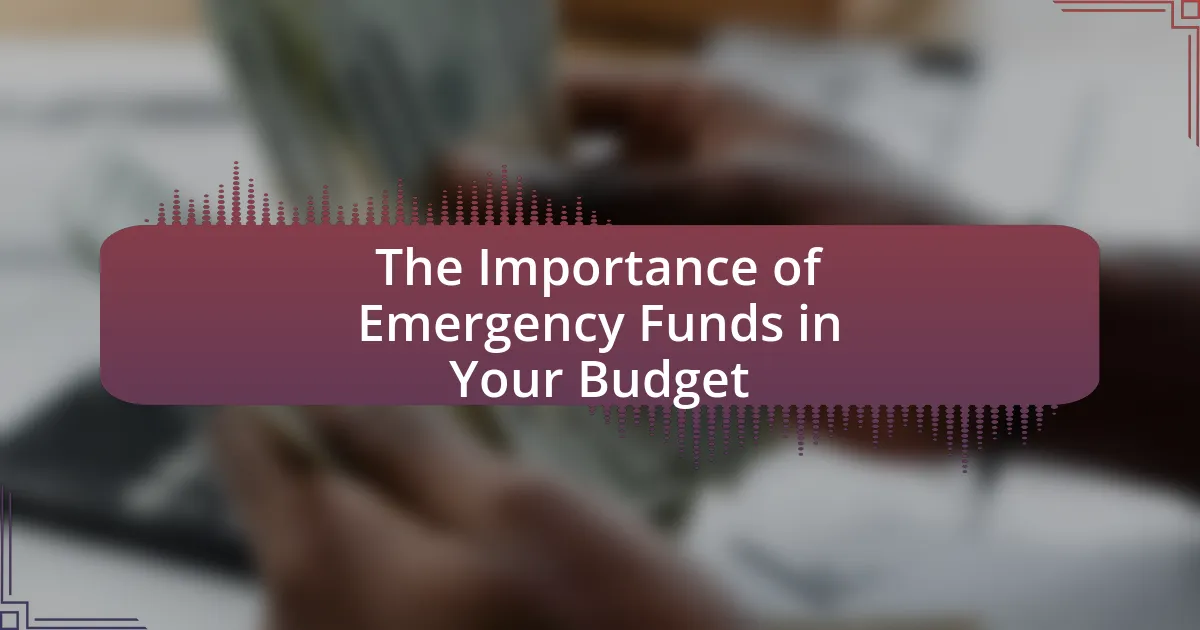The article focuses on the ten common budgeting mistakes that individuals often make, which include failing to set clear financial goals, neglecting to track expenses accurately, and not adjusting budgets regularly. It emphasizes the importance of identifying these mistakes to enhance financial health and achieve long-term financial goals. The article also provides strategies to avoid these errors, such as creating a detailed budget, utilizing budgeting tools, and regularly reviewing financial plans. By addressing these common pitfalls, individuals can improve their budgeting practices and foster better financial discipline.

What are the 10 Common Budgeting Mistakes?
The 10 common budgeting mistakes are:
- Not setting clear financial goals.
- Failing to track expenses accurately.
- Underestimating variable expenses.
- Ignoring irregular expenses.
- Not adjusting the budget regularly.
- Overlooking savings for emergencies.
- Relying solely on memory for financial decisions.
- Creating an unrealistic budget.
- Neglecting to involve all household members in budgeting.
- Failing to review and analyze spending habits.
These mistakes can lead to financial stress and hinder effective money management. For instance, studies show that individuals who set specific financial goals are more likely to achieve them, highlighting the importance of clear objectives in budgeting.
Why is it important to identify budgeting mistakes?
Identifying budgeting mistakes is crucial because it allows individuals and organizations to optimize their financial resources and improve overall financial health. By recognizing errors in budgeting, such as overspending or misallocating funds, one can make informed adjustments that enhance financial planning and prevent future deficits. Research indicates that 60% of individuals fail to stick to their budgets due to common mistakes, highlighting the importance of identifying these errors to foster better financial discipline and achieve financial goals effectively.
How can recognizing these mistakes improve financial health?
Recognizing budgeting mistakes can significantly improve financial health by enabling individuals to make informed decisions that enhance their savings and reduce unnecessary expenditures. When individuals identify errors such as overspending, neglecting to track expenses, or failing to set realistic financial goals, they can adjust their budgeting strategies accordingly. For instance, a study by the National Endowment for Financial Education found that individuals who actively monitor their spending habits are 50% more likely to stick to their budgets and achieve their financial goals. This proactive approach leads to better financial management, increased savings, and ultimately, improved financial stability.
What impact do budgeting mistakes have on long-term financial goals?
Budgeting mistakes significantly hinder the achievement of long-term financial goals by creating imbalances in financial planning and resource allocation. When individuals fail to accurately track expenses or underestimate costs, they may find themselves unable to save adequately for future needs, such as retirement or major purchases. Research indicates that nearly 60% of Americans do not follow a budget, leading to increased debt and reduced savings rates, which directly impacts their ability to meet long-term financial objectives. Consequently, consistent budgeting errors can result in a cycle of financial instability, making it challenging to build wealth over time.
What are the most frequent budgeting errors people make?
The most frequent budgeting errors people make include underestimating expenses, failing to track spending, and not adjusting budgets for changes in income or expenses. Underestimating expenses often leads to budget shortfalls, as individuals may overlook variable costs such as groceries or utilities, which can fluctuate significantly. Failing to track spending results in a lack of awareness about where money is going, making it difficult to adhere to a budget. Additionally, not adjusting budgets for changes, such as a salary increase or unexpected medical bills, can render a budget ineffective, as it does not reflect current financial realities. These errors are commonly cited in financial studies, highlighting the importance of accurate expense forecasting and regular budget reviews.
How does failing to track expenses lead to budgeting issues?
Failing to track expenses leads to budgeting issues by creating an inaccurate financial picture, which prevents effective financial planning. Without tracking, individuals cannot identify spending patterns, leading to overspending in certain categories and insufficient funds for essential expenses. Research indicates that 60% of people do not track their expenses, resulting in a lack of awareness about their financial situation, which can lead to debt accumulation and financial stress. Accurate expense tracking is essential for creating a realistic budget that aligns with income and financial goals.
What are the consequences of not setting realistic budget goals?
Not setting realistic budget goals can lead to financial instability and increased stress. When individuals or organizations create budgets that are overly ambitious or unattainable, they often experience overspending, which can result in debt accumulation. According to a study by the National Endowment for Financial Education, 70% of Americans report feeling stressed about their financial situation, often due to unrealistic budgeting practices. Additionally, unrealistic goals can lead to a lack of motivation and disengagement from the budgeting process, as repeated failures to meet these goals can diminish confidence in financial planning. This cycle can perpetuate poor financial habits and hinder long-term financial health.

How can you avoid common budgeting mistakes?
To avoid common budgeting mistakes, individuals should create a detailed budget that accurately reflects their income and expenses. This involves tracking all sources of income and categorizing expenses into fixed and variable costs. Research indicates that 60% of people do not stick to their budgets due to lack of clarity and unrealistic expectations. By regularly reviewing and adjusting the budget, individuals can ensure it remains relevant and effective, thereby reducing the likelihood of overspending and financial stress.
What strategies can help in preventing budgeting errors?
To prevent budgeting errors, individuals should implement regular reviews of their budget, utilize budgeting software, and set realistic financial goals. Regular reviews allow for adjustments based on actual spending versus planned spending, helping to identify discrepancies early. Budgeting software can automate calculations and track expenses in real-time, reducing human error. Setting realistic financial goals ensures that budgets are achievable and aligned with actual income and expenses, which is supported by studies indicating that specific, measurable goals lead to better financial outcomes.
How does creating a detailed budget plan mitigate mistakes?
Creating a detailed budget plan mitigates mistakes by providing a clear framework for tracking income and expenses. This structured approach allows individuals to identify potential overspending and allocate funds appropriately, reducing the likelihood of financial errors. Research indicates that individuals who use detailed budgeting methods are 30% more likely to stay within their financial limits compared to those who do not. By outlining specific categories and amounts, a detailed budget helps prevent miscalculations and ensures that all financial obligations are accounted for, leading to more informed decision-making.
What role does regular budget review play in avoiding errors?
Regular budget review plays a critical role in avoiding errors by ensuring that financial allocations align with actual expenditures and anticipated needs. This ongoing assessment allows organizations to identify discrepancies, such as overspending or misallocated funds, before they escalate into significant issues. For instance, a study by the Association for Financial Professionals found that organizations that conduct regular budget reviews are 30% more likely to stay within their budget limits compared to those that do not. By systematically analyzing budget performance, organizations can make timely adjustments, thereby enhancing financial accuracy and accountability.
Why is it essential to adjust your budget regularly?
Adjusting your budget regularly is essential to ensure it reflects your current financial situation and goals. Regular adjustments account for changes in income, expenses, and financial priorities, which can fluctuate due to factors such as job changes, unexpected expenses, or shifts in personal circumstances. According to a study by the National Endowment for Financial Education, individuals who regularly review and adjust their budgets are more likely to achieve their financial goals, as they can respond proactively to financial challenges and opportunities.
How can changes in income or expenses affect your budget?
Changes in income or expenses directly impact your budget by altering the available funds for spending and saving. When income increases, individuals can allocate more towards savings or discretionary spending, potentially improving financial stability. Conversely, a decrease in income necessitates cuts in expenses, which may lead to reduced quality of life or increased debt if not managed properly. For example, a study by the Bureau of Labor Statistics shows that households adjust their spending patterns significantly in response to income fluctuations, indicating that effective budgeting requires continuous monitoring of both income and expenses to maintain financial health.
What methods can be used to adapt your budget effectively?
To adapt your budget effectively, regularly review and adjust your spending categories based on actual expenses and income fluctuations. This method allows for real-time adjustments, ensuring that your budget remains aligned with your financial goals. For instance, a study by the National Endowment for Financial Education found that individuals who frequently track their spending are more likely to stay within their budget and achieve their financial objectives. Additionally, utilizing budgeting tools or apps can facilitate this process by providing insights into spending patterns and helping to identify areas for potential savings.

What are the specific budgeting mistakes to watch out for?
Specific budgeting mistakes to watch out for include underestimating expenses, failing to track spending, neglecting to adjust for irregular income, and not setting realistic financial goals. Underestimating expenses can lead to budget shortfalls, as many individuals overlook variable costs such as groceries and utilities. Failing to track spending results in a lack of awareness about where money is going, which can derail financial plans. Neglecting to adjust for irregular income, common among freelancers, can create cash flow issues if expenses exceed income during lean months. Lastly, not setting realistic financial goals can lead to frustration and demotivation, as unattainable targets often result in abandoning the budget altogether.
How does overspending in certain categories impact your budget?
Overspending in certain categories negatively impacts your budget by creating imbalances that lead to financial strain. When individuals exceed their planned expenditures in areas such as dining, entertainment, or shopping, they divert funds from essential categories like savings, bills, or debt repayment. This misallocation can result in insufficient resources to cover necessary expenses, potentially leading to late fees, increased debt, or the need to borrow money. According to a 2021 survey by the National Endowment for Financial Education, 60% of respondents reported that overspending in discretionary categories caused them to struggle with meeting their financial obligations.
What are the common categories where people overspend?
People commonly overspend in categories such as dining out, entertainment, groceries, clothing, and personal care. Research indicates that dining out accounts for a significant portion of discretionary spending, with surveys showing that individuals often underestimate their monthly food expenses by as much as 20%. Entertainment expenses, including subscriptions and outings, frequently exceed budgeted amounts, as people tend to indulge in experiences. Grocery shopping often leads to overspending due to impulse purchases and lack of meal planning, with studies revealing that consumers can spend up to 30% more than intended. Clothing purchases can also spiral out of control, particularly during sales events, where shoppers may buy items they do not need. Lastly, personal care services, such as haircuts and spa treatments, can lead to budget overruns when individuals do not track these recurring expenses.
How can you set limits to prevent overspending?
To set limits to prevent overspending, create a detailed budget that allocates specific amounts for each spending category. This budget should reflect your income and necessary expenses, allowing you to identify discretionary spending limits. Research indicates that individuals who use budgeting tools are 50% more likely to stick to their financial goals, as they provide a clear framework for managing money. By regularly reviewing and adjusting your budget, you can maintain control over your spending habits and avoid financial pitfalls.
What is the danger of neglecting savings in your budget?
Neglecting savings in your budget can lead to financial instability and increased vulnerability to unexpected expenses. Without a savings buffer, individuals may struggle to cover emergencies, such as medical bills or car repairs, which can result in debt accumulation. According to a report by the Federal Reserve, nearly 40% of Americans would struggle to cover a $400 emergency expense without borrowing or selling something. This statistic highlights the critical importance of savings in maintaining financial security and avoiding reliance on high-interest debt options.
How can a lack of savings affect financial stability?
A lack of savings can significantly undermine financial stability by limiting an individual’s ability to manage unexpected expenses and emergencies. Without savings, individuals may resort to high-interest debt options, such as credit cards or payday loans, which can lead to a cycle of financial strain. According to a 2021 report by the Federal Reserve, nearly 40% of Americans would struggle to cover a $400 emergency expense without borrowing or selling something, highlighting the critical role savings play in financial resilience. This lack of a financial cushion can result in increased stress, reduced investment in future opportunities, and a greater likelihood of financial setbacks.
What strategies can ensure savings are prioritized in budgeting?
To ensure savings are prioritized in budgeting, individuals should implement the “pay yourself first” strategy, which involves allocating a specific percentage of income to savings before addressing other expenses. This method is supported by behavioral finance research indicating that automatic savings contributions lead to higher savings rates, as individuals are less likely to spend money they do not see. Additionally, setting clear savings goals and tracking progress can reinforce the importance of saving, making it a priority in financial planning.
How can emotional spending derail your budget?
Emotional spending can derail your budget by leading to impulsive purchases that exceed planned expenses. When individuals experience strong emotions such as stress, sadness, or excitement, they may turn to shopping as a coping mechanism, resulting in unplanned expenditures. Research indicates that emotional spending can account for up to 30% of discretionary spending, significantly impacting overall financial health. This behavior disrupts budgeting efforts by diverting funds from essential expenses and savings, ultimately creating financial strain and hindering long-term financial goals.
What triggers emotional spending and how can you recognize them?
Emotional spending is primarily triggered by feelings such as stress, anxiety, loneliness, or boredom. Individuals often engage in shopping as a coping mechanism to alleviate negative emotions or to seek temporary happiness. Recognizing emotional spending involves identifying patterns such as impulsive purchases during emotional highs or lows, frequent shopping trips after stressful events, or using shopping as a reward for oneself. Research indicates that 62% of consumers admit to making impulse purchases, often driven by emotional states, highlighting the prevalence of this behavior.
What techniques can help manage emotional spending habits?
Techniques to manage emotional spending habits include setting a budget, practicing mindfulness, and implementing a waiting period before making purchases. Establishing a budget helps individuals track their spending and identify areas where emotional purchases occur. Mindfulness techniques, such as meditation or journaling, can increase awareness of emotional triggers that lead to spending. A waiting period, typically 24 hours, allows individuals to evaluate the necessity of a purchase, reducing impulsive decisions driven by emotions. Research indicates that these strategies can significantly decrease impulsive buying behavior, leading to better financial management.
What practical tips can help you avoid budgeting mistakes?
To avoid budgeting mistakes, create a detailed budget plan that includes all income sources and expenses. This approach ensures that you have a clear understanding of your financial situation. Regularly track your spending against this budget to identify discrepancies and adjust as necessary. Research indicates that individuals who actively monitor their budgets are 30% more likely to stay within their financial limits. Additionally, setting realistic financial goals can help maintain focus and motivation, reducing the likelihood of overspending.
How can technology assist in effective budgeting?
Technology assists in effective budgeting by providing tools that automate tracking, analysis, and reporting of financial data. Budgeting software and applications enable users to categorize expenses, set financial goals, and monitor spending in real-time, which enhances accuracy and accountability. For instance, a study by the National Endowment for Financial Education found that individuals using budgeting apps reported a 20% increase in their ability to stick to their budgets. Additionally, cloud-based platforms allow for easy access to financial information from multiple devices, facilitating collaboration and informed decision-making.
What are the best practices for maintaining a successful budget?
The best practices for maintaining a successful budget include setting clear financial goals, tracking income and expenses meticulously, and regularly reviewing and adjusting the budget as needed. Setting specific financial goals provides direction and motivation, while meticulous tracking of income and expenses ensures that spending aligns with those goals. Regular reviews allow for adjustments based on changing circumstances or unexpected expenses, which is crucial for staying on track. According to a study by the National Endowment for Financial Education, individuals who actively track their spending are more likely to stick to their budgets and achieve their financial goals.





